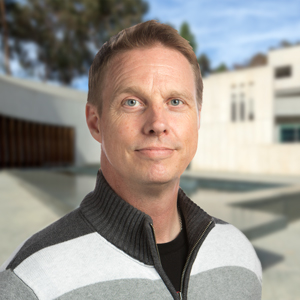Source: Interfolio F180

Michael Boddy, PhD
Research Focus
DNA Repair and the Maintenance of Genomic Stability.
Our laboratory uses the genetically tractable fission yeast as a model system to study proteins involved in the maintenance of genomic stability. Loss of genomic integrity is causally associated with cancer and other diseases. The pathways that we study are highly conserved across species and thus provide a valuable framework for analysis of the analogous human pathways.
Currently we are studying functional interactions between proteins of the DNA repair and replication checkpoint systems. The replication checkpoint senses replication perturbations and coordinates cellular responses such as cell-cycle arrest, replication fork-stabilization and DNA repair. The enforcer of the replication checkpoint is a kinase called Cds1 (Human Chk2). The way in which Cds1 arrests cell-cycle progression when replication is blocked has been worked out in some detail. However, little is known about the targets of Cds1 that are important for replication fork stability and DNA repair. We have identified novel DNA repair factors that are regulated via Cds1-dependent phosphorylation. We are currently determining the precise molecular function(s) of these DNA repair proteins so that we can understand how their regulation by Cds1 mitigates genome damage.
Education
Ph.D., King's College, University of London & Cancer Research, UK, 1996Professional Experience
2013-2017 Associate Professor, Cell and Molecular Biology (CMB), Scripps Research2007-2012 Associate Professor, Molecular Biology, Scripps Research
2002-2007 Assistant Professor, Molecular Biology, Scripps Research
1997-2002 Research Associate, Molecular Biology, Scripps Research
Awards & Professional Activities
2001 Individual National Research Service Award2003 Research Special Fellowship, The Leukemia and Lymphoma Society of America
2008 NIH Study Section ZRG1 GGG-H, NIH
2009 NIH Study Section ZRG1 GGG-F, NIH
2010 EMBO Editorial Board, EMBO
2011 NIH Study Section MGB, NIH
2014 Scholar, The Leukemia and Lymphoma Society of America
2014 NIH Study Section ZRG1 GGG-R, NIH
2014 NIH Director's Early Independence Award Review, NIH
2015 NIH Study Section MGB, NIH; 2019 Editorial board of Cells, Cells
2022 Ongoing reviewer of manuscripts for a number of high quality journals
2022 Ongoing hosting high school STEM students for laboratory experience and exposure to real-world science
Selected Publications
Boddy, Michael N; Tainer, John A; Groocock, Lynda M; Nie, Minghua; Prudden, John; Moiani, Davide; Wang, Tao; Cheltsov, Anton; Rambo, Robert P; Arvai, Andrew S; Hitomi, Chiharu; Luger, Karolin; Perry, J Jefferson P; Lazzerini‐Denchi, Eros RNF 4 interacts with both SUMO and nucleosomes to promote the DNA damage response. EMBO reports 2014, 15, 601-608.
[View]
Zilio, Nicola; Wehrkamp-Richter, Sophie; Boddy, Michael N. A new versatile system for rapid control of gene expression in the fission yeast Schizosaccharomyces pombe. 2012, 29, 425-34.
[View]
Boddy, Michael N.; Smith, Gerald R.; Prudden, John; Hyppa, Randy W.; Wehrkamp-Richter, Sophie Meiotic DNA joint molecule resolution depends on Nse5-Nse6 of the Smc5-Smc6 holocomplex. Nucleic Acids Research 2012.
[View]
Nie, M. H.; Aslanian, A.; Prudden, J.; Heideker, Christine J.; Vashisht, A. A.; Wohlschlegel, J. A.; Yates, John R.; Boddy, Michael Dual recruitment of Cdc48 (p97)-Ufd1-Npl4 ubiquitin-selective segregase by small ubiquitin-like modifier protein (SUMO) and ubiquitin in SUMO-targeted ubiquitin ligase-mediated genome stability functions. Journal of Biological Chemistry 2012, 287, 29610-29619.
[View]
Boddy, Michael N.; Groocock, Lynda M.; Prudden, John; Perry, J. Jefferson P. The RecQ4 Orthologue Hrq1 Is Critical for DNA Interstrand Cross-Link Repair and Genome Stability in Fission Yeast. Molecular and Cellular Biology 2012, 32, 276-287.
[View]
Boddy, Michael N.; Tainer, John A.; Prudden, John; Perry, J. Jefferson P.; Nie, Minghua; Vashisht, Ajay A.; Arvai, Andrew S.; Hitomi, Chiharu; Guenther, Grant; Wohlschlegel, James A. DNA Repair and Global Sumoylation Are Regulated by Distinct Ubc9 Noncovalent Complexes. Molecular and Cellular Biology 2011, 31, 2299-2310.
[View]

